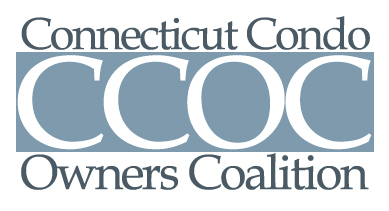CCOC’s Legislative Proposals Enacted In Connecticut
The CT Condo Owners Coalition [CCOC] is very pleased that the Legislature passed a bill during the last few days of the session that will benefit unit owners residing in common interest communities throughout Connecticut (Substitute Senate Bill 457 (File 613, as amended by Senate “A”. This legislation is now Public Act 14-215, “An Act Concerning Revisions to the Common Interest Ownership Act”).
Sections of this bill, focusing on voting by board members, resale certificates and increasing penalties for community association managers who violate the law, were presented by CCOC as part of their 2014 legislative package to the Legislature in January of this year. CCOC submitted written testimony and testified in favor of the bill, recommended some changes, and worked with Representative James Albis, Senator Paul Doyle, and Kim McClain and Atty. Scott Sandler of the Community Association Institute [CAI] to negotiate language for amendments that the legislature adopted.
We want to offer a special note of appreciation to Representative Albis who was instrumental in getting this legislation passed. We would also like to thank the Chairs of the Judiciary Committee where the bill originated: Senator Eric Coleman and Representative Gerald Fox as well as Senator Paul Doyle and the other members of the Judiciary Committee members who offered their support.
Following is a summary of Substitute Senate Bill 457 (File 613, as amended by Senate “A”)AN ACT CONCERNING REVISIONS TO THE COMMON INTEREST OWNERSHIP ACT. The bill also makes some technical changes to other condominium provisions.
VOTING BY BOARD MEMBERS
The bill makes it easier for unit owners to know how well directors are serving their interests by requiring the minutes of executive board meetings to indicate how each board member voted on any final action the board proposed to take, unless the board approved the action unanimously or without any member objecting. (Effective Date: October 1, 2014)
ELECTION OF BOARD MEMBERS
The bill makes it easier to elect board members by establishing a default rule that association directors and officers are elected by plurality vote instead of by majority vote unless the Declaration, other provisions of CIOA or other law requires a higher percentage. Quorum requirements will still have to be satisfied. (Effective Date: October 1, 2014)
RESALE CERTIFICATE
CIOA [Common Interest Ownership Act] requires unit owners to provide a purchaser with certain information before selling a unit. The bill requires that this information also indicate the most recent fiscal period within the preceding five years for which an independent certified public accountant reported on a financial statement and whether that report was a compilation, review or audit. In addition to helping prospective buyers, it is hoped that this provision will pressure boards to maintain better books and accounting standards. (Effective Date: October 1, 2014)
COMMUNITY ASSOCIATION MANAGERS
The law prohibits community association managers from engaging in certain conduct. Violations are punishable by a fine of up to $500, up to a year in prison, or both. The bill increases the maximum fine to $1,000. (Effective date: October 1, 2014)
TERMINATION OF MASTER ASSOCIATIONS
The bill establishes a procedure to terminate certain master associations and transfer the association’s assets to a new non-stock corporation, upon the consent of 25% of the unit owners. This new procedure only applies to master associations: (1) comprised of common interest communities consisting of at least 400 units; (2) governed by a board of directors consisting of one individual representing each constituent common interest community, who is on the constituent community’s board; and (3) whose board has a weighted vote based on the number of units in the constituent community represented by the director. (Effective date: January 1, 2015)
CCOC also supported another bill, HB 5590, “An Act Establishing a Pilot Program for the Mediation of Condominium-Related Disputes. This proposed legislation would have established a pilot mediation program for disputes between unit owners and associations. Although the bill successfully made it out of the Judiciary Committee, the full House or Senate did not act on it apparently because of costs associated with the bill if implemented.
CCOC recognizes that unit owners need a forum to resolve disputes with association boards of directors and community association managers that is more expedient and less expensive than Superior Court. CCOC strongly believes unit owners need a less expensive and faster process to resolve disputes and will continue to look toward possible solutions for this problem and is working on drafting a proposal for the Legislature to consider next year.






A Big Thank You!
Congratulations to all for a job well done!
You may recall that a roofer died on the grounds of Sunwood Condominiums, located in Shelton Conn. on 2/14/13!
Regrettably the very same conditions that led to the death of the worker prevailed well before his demise and as of 4/2014 continue unabated! This is a tragedy that must be addressed as the Board Members and its Agent have operated under the radar of the local police, OSHA of Bridgeport and the City of Shelton Building department! A letter (stop work order request )sent to the Mayor of Shelton by this 25 year resident fell upon deaf ears as he elected to neither acknowledge nor respond). In explicably skylights installed by the same contrator whose worker died were literally falling out of the ceiling as they were not installed in accordance with building codes and manufacturer installation instructions provided with each unit! How this got by the Building Department folks at Shelton City Hall remains a mystery to me. How work permits could be issued to a contractor who allegedly was neither licened nor insured is equally mystifying! OSHA of Bridgeport has demonstrated it neither has the resources nor the will to put “recitivist residential building contractor violators of Conn. Law out of business, particularly if they employ what I believe may be illegals!!! I can only guess that by doing so OSHA would in effect be putting themselves out of work!
I like the resale certificate law! that’s progress!
What does the resale certificate mean? if a new owner wants to buy said condo and wants to see the records first before buying the condo they are allowed? If they see the records after and don’t like it and they bought the condo its kind of too late I am thinking. Does this mean the condo association has to have had a certified accountant complete a review or audit? Thank you.
I live in a Cooperative in Stratford. We have an office manager. Several years ago when legislation was passed regarding Property Manager having requirements relating to schooling I was thrilled. However the cooperative attorney called and asked if the office manager who he referred to as an employee was required to have the schooling such as a property manager was required to have, he claimed the response he received was no. The office manager has been here since at least March 2006 and to date I do not believe the Board has done anything that would require him to go school to improve his office skills or interaction with the cooperative members as a whole nor has he taken the initiative to do so on his own. Do you think it is at all possible that legislation could be passed that would require such schooling? He has had numerous pay raises since he began his employment here and receives fringe benefits which have been to his betterment. As an after thought perhaps the employee can pay for the schooling up front and be reimbursed for one half of the cost upon producing a certificate supporting he has passed the grade requirements. It is my feeling and belief this would be to the betterment of the community as a whole.
On August 28, 2014, our condo Association voted out the entire Board of Directors who previously only scheduled one (1) meeting from June 2012 thru July 2014.
Also the Board did not schedule an annual meeting during the same time frame of June 2012 through July 2014, nor did they produce financial statements from the period of June 2012 through August 2014.
My questions are as follows: 1. Can the Board request that the Property Manager not allow access to financial statements to a unit owner?
2. If a unit owner requests copies of the financial statements or a review of them, what is the timeframe by which the Board and/or the Property Manager must comply with the request.